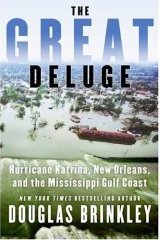 I am currently reading "The Great Deluge" by Douglas Brinkley, a book about what happened in New Orleans during hurricane Katrina. We are currently discussing this as part of our work at the Mercatus Center. We are discussing issues such as what went wrong, investigating government vs. private decision making and their consequences during these events, effects of centralized decision-making, how a negative entrepreneurial environment is hindering reconstruction (compared to more favorable environments such as Florida), etc. I just finished chapter 1 of the book and thus far it is a great read. I've been listening to Louis Armstrong while reading to try to add to the "flavor" of New Orleans to the reading.
I am currently reading "The Great Deluge" by Douglas Brinkley, a book about what happened in New Orleans during hurricane Katrina. We are currently discussing this as part of our work at the Mercatus Center. We are discussing issues such as what went wrong, investigating government vs. private decision making and their consequences during these events, effects of centralized decision-making, how a negative entrepreneurial environment is hindering reconstruction (compared to more favorable environments such as Florida), etc. I just finished chapter 1 of the book and thus far it is a great read. I've been listening to Louis Armstrong while reading to try to add to the "flavor" of New Orleans to the reading.Armstrong's relaxing melodies are stark contrast to reading about the damage of such a devastating storm. Here is how Wikipedia describes it:
I have to confess, after finding out my cousin who lived in New Orleans was okay, to not keeping up well with the events during and after Katrina. I had just started my PhD when it happened and was working two part-time jobs in addition to going to school. I regret this, as I have had some connection to New Orleans over the years -- business trips with Westinghouse and Mitsubishi to work with Entergy, academic conferences, etc. Memories of Cafe du Monde, listening to jazz music at Preservation Hall with a Japanese coworker, watching magic tricks at the Riverwalk, eating my first bowl of turtle soup, seeing my cousin's house just a few blocks off Bourbon Street, etc. While these areas are still intact, much more of what I saw is no longer there and many of the people I've known and worked with over the years have had their lives inalterably affected by Katrina. This all serves to reminded I have a much stronger connection to the city than I realized.
Katrina is estimated to be responsible for $81.2 billion (2005 US dollars) in damages, making it the costliest natural disaster in U.S. history. The storm killed at least 1,836 people, making it the deadliest U.S. hurricane since the 1928 Okeechobee Hurricane. Criticism of the federal, state and local governments' reaction to the storm was widespread and resulted in an investigation by the United States Congress and the resignation of FEMA head Michael Brown.
As I am becoming more familiar with the events leading up to, during, and after the disaster, I am also becoming increasingly interested in understanding all of this and their effects from both a political and economic perspective. The idea of an unfavorable business environment hindering recovery is particularly an interesting study that has incredible relevance to understanding barriers to economic development in other parts of the world. The incentives followed by politicians which lead to numerous break-downs in decision making is another area of intrigue.
Professor Peter Boettke deserves great credit for focusing on this issue. Here is a description of the Katrina research project in his own words:
Read more about Mercatus related thoughts on this here and here.
As readers of this site will know, I am heading up a project on Katrina at the Mercatus Center (e.g., here, here, here, here, here, here, here, here) that is focusing on three dimension of social transformation --- civil society and social capital; political economy and governance; entrepreneurship and cities. At the intellectual level this project represents a variety of intellectual arbitrage opportunities: Lachmann and Putnam; Hayek and Tullock; Kirzner and Jane Jacobs. For example, in rethinking the rebuilding of New Orelans Jacob's ideas about dense cities and the role of commerceical life are extremely relevant (and don't contradict the Cowen thesis about shantytowns on the edge of the city).
Katrina unfortunately has provided economists and public policy analysts with a 'natural experiment' in which nature's fury enables us to study both the folly of man (due to both his hubris and incompetence) and the capacity of human beings to stare adversity in the face and fight it back with the ultimate resource --- the human imagination.
I hope to blog more on these issues as I learn more.
No comments:
Post a Comment